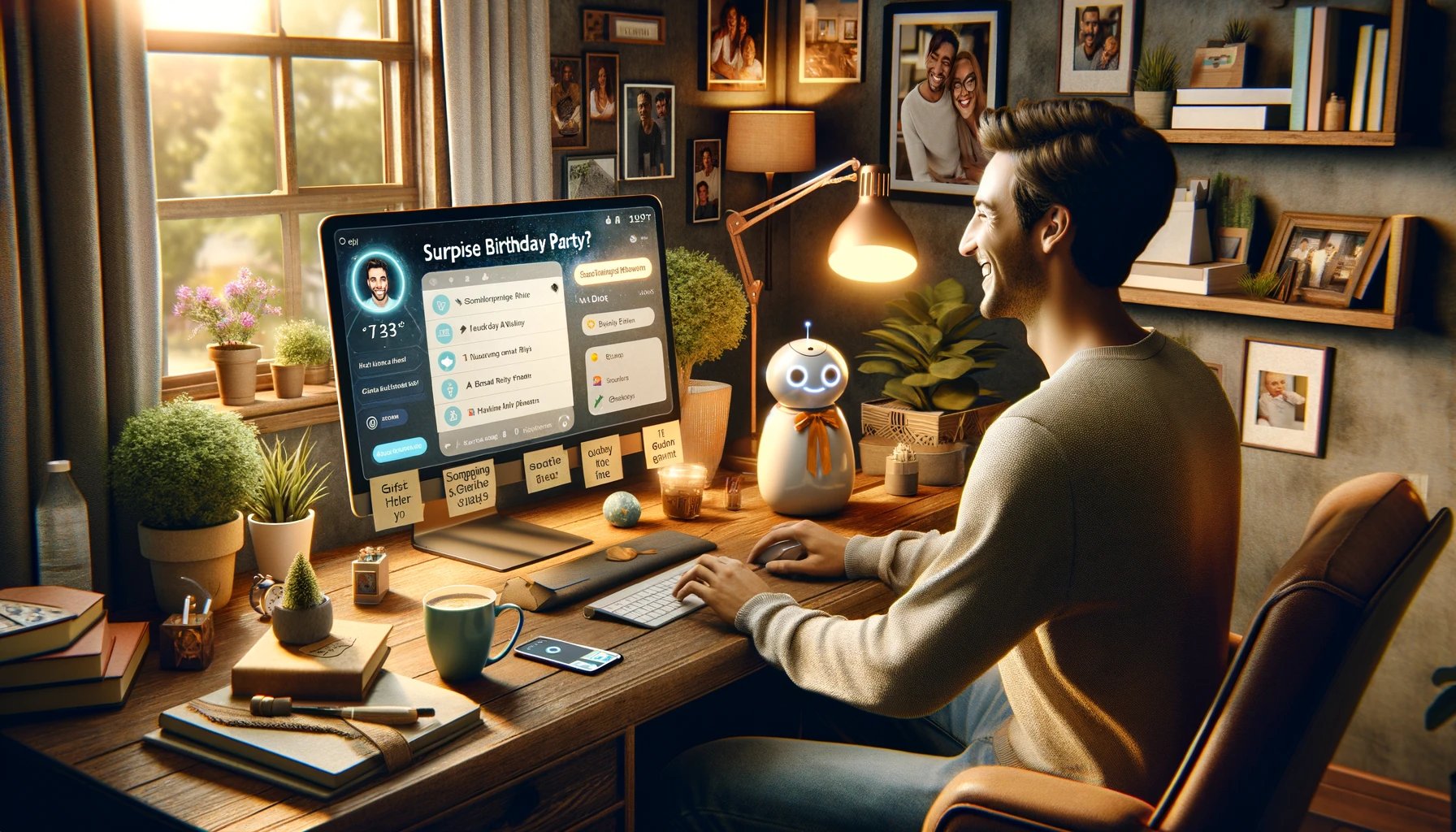AI tools like ChatGPT open up a world of inspiration, ideas and productivity for anyone starting a side hustle or small business. Which is why you should see them as an essential part of your sales and marketing toolkit.
Before you dive in you need to know how to use them effectively. That means understanding both the value of AI and its limitations. Otherwise you risk, at best, looking bland, and, at worst, misinformed or toxic. And that could cause real harm to your business and your personal brand.
In this article we look at how to get the best out of AI tools and avoid making a mess of it.
Why you need to be careful with AI

(image created by Simon Bullmore using DALL-E, via ChatGPT 4)
To understand why AI systems could do your business harm it's worth understanding how they work.
Bear with me or skip to the section below if you know this bit.
Stay with me for a moment if you don't, because I really think it's essential. Why? Well, when starting to drive a car, you don't just jump in, push some pedals and hope you don't crash - you build a basic understanding of how the different controls combine, to get where you want to go, safely.
Grasp how AI tools work and you'll be more ready to use them safely and effectively.
AI stands for Artificial Intelligence. You likely know that already. But let's dig into the words:
- Artificial, because it is a digital tool created by people.
- Intelligence, because these systems are judged to behave in a manner that people associate with intelligent entities - they can learn and respond to their environment and create new things.
Systems that marketing people use, like ChatGPT are a type of AI called "Generative AI".
"Generative AI" because they generate new outputs like text and images, based on our requests. To be able to do that they are trained using huge amounts of data. This data is most often things that are published on the web like pages, blogs and images.
The training is designed to teach machines what different things are and how they connect together. So that Generative AI can fulfil one purpose, and one purpose only - giving you what you expect to see.
ChatGPT, for example responds to a natural language prompt you give it by looking at it's database, and then, by using what it has learned, to craft sentences, writing one word and then figuring out what word works next.
The result? Generative AI tools give you what you expect. And that points to both their strength and their weakness.
AI is really just "Average Intelligence"

(image created by Simon Bullmore using DALL-E, via ChatGPT 4)
The data AI uses is the whole of the data of the internet - the good, the bad and the ugly. And that means that tools like AI have come up with an average view of what you expect to get from them.
This means that you have to be aware of this quality of "averageness" when you use them.
The results you can get from AI are the same results anyone can get. And some of the results you will get will be completely wrong. Why is that?
Remember, all an AI tool aims to give you is what it thinks you are expecting. It doesn't care if it is right or wrong, boring or bold, friendly or toxic. It's a machine and it's not designed to care.
All AI can do is try and give you what you expect. So if you want something new, something authentic, something bold, well, that still has to come from you.
Your job as a marketer using AI is therefore to get good results and avoid the bad.
Top tips: how to get the most out of your super-keen AI sidekick
In marketing, AI systems can do a lot of the hard work for us - because they've already processed lots of data and information and are really good at doing that. That makes them super helpful for what were once time consuming marketing tasks like research, and checking copy then improving it. We just need to be aware that all they are doing is giving us what we ask them for.
So your first tip is this,
Tip 1. Avoid the ick - never trust what AI tells you

- AI outputs will always be average - they're based on the average everything other people have created
- AI outputs will always need checking - some of what they are based on will be incorrect.
- Use your common sense when reviewing AI outputs.
- If in doubt cross reference using a web search or, even better someone who knows the topic.
The best uses of AI for content often come from people who already know their topic and use AI to help them produce content more quickly and then polish it to make it more human, more inspiring, and more effective.
That brings us to our next suggestion...
Tip 2. Use AI to make you more not less human

(image created by Simon Bullmore using DALL-E, via ChatGPT 4)
In a world awash with content how do you set yourself apart? It's not by copying the rest. And it's not by being average.
These days people have a strong urge for things that are real. And that's what authenticity is - being real, being honest, being yourself.
Your marketing will shine when you tap into your own experiences, feelings and dreams and share them in ways that get other people inspired. AI systems don't have your soul so don't let them overshadow you.
This means using AI in ways that augment your own ideas. Here's how:
- Use AI for research, ideas, and insights. But your final copy and content should be in your own voice - the words, phrases and patterns that make you unique.
- Use AI to polish and copy-edit your work. It can help you condense ideas down, correct mistakes and suggest better ways to express yourself. That's what copy editors do, they help you sound more like you whilst making sure your writing is clear and concise.
That still leaves you with the problem of replicating what others have already said and done. How do you stand out from the crowd?
Tip 3. Don't be average - be bold, be you

(image created by Simon Bullmore using DALL-E, via ChatGPT 4)
More than 80% of marketers use AI in their work. This is resulting in heaps of content - a veritable deluge of words and images. And this in turn is what the AI systems are using to teach themselves. Average data, leads to average outputs, which leads to more average data, and even more average outputs which...well you get the picture.
We should always remember that marketing has a singular purpose - to inspire an audience to do something. And we humans don't get inspired unless we feel something. When we are afraid, excited or hungry we do something about it. That's how marketing works; it makes us feel that we can address a need we have and prompts us to take action.
Machines don't feel, so they're not very well placed to help us stimulate feelings in others. That doesn't mean they can't contribute to coming up with ideas or help out. Here's how to avoid being average with your AI content:
- Use AI systems to rapidly come up with ideas or to conduct research.
- Use your own insights into your audience to ask ChatGPT to refine its outputs.
- Add your own flair, ideas and words.
- Push it all a bit further - be bold, don't be bland.
- Review what you are creating with a critical eye. Don't be satisfied until you really feel you're hitting the mark.
The fundamental? Make it sound real. And the easiest way to do that is to make it sound like you. That's what AI can help with. Freeing up your time s you can make your content look and sound like it has come from the best, clearest, most compelling version of yourself.
You, do you

(image created by Simon Bullmore using DALL-E, via ChatGPT 4)
Remember, boring and average are the opposite of what marketing should be about. With a world of choice out there you need to rise above the rest, and do that in ways that are authentic to you and your business.
When you start out you are a big part of the brand, the product and the service. Don't let AI squeeze your essence out of that mixture. Use it to save time. Use it to make your work better. Use it to amplify the bits of you and your product that your audience will really care about.
And never settle for anything that's just average. You and your customers need to know that you're better than that.
Tags:
MindsetMar 15, 2024 4:58:18 PM




Comments